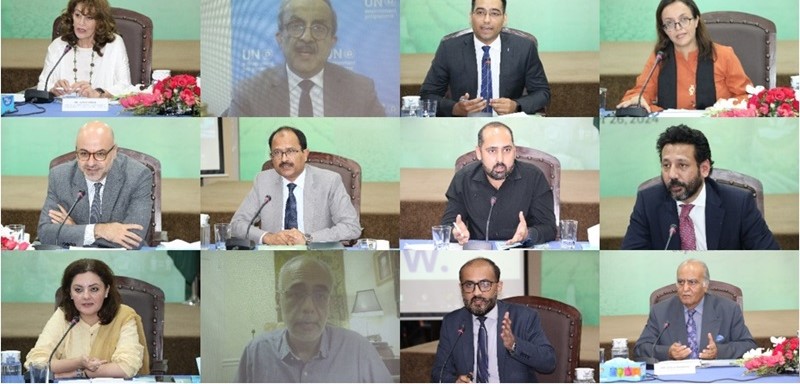WNAM REPORT: The ISSI-HSF International Conference on “Navigating Pakistan’s Climate Action Path: Adaptation, Finance, and Technology” featured a keynote address by H.E. Khazar Farhadov, Ambassador of Azerbaijan to Pakistan, and a special address by Chief Guest Senator Sherry Rehman. The event drew a significant gathering of diplomats, climate practitioners, and academics, reflecting strong interest in addressing Pakistan’s climate challenges.
The Inaugural Session was followed by two insightful panel discussions that explored key drivers of climate adaptation, financing mechanisms, and the role of green technology in shaping Pakistan’s climate response. Experts emphasized the urgent need for innovative solutions, global cooperation, and strategic investments in climate resilience, stressing that Pakistan must lead by example as it approaches COP29. The discussions highlighted Pakistan’s unique vulnerability to climate impacts and its potential to serve as a regional leader in sustainable climate action, setting the stage for continued engagement on the global stage.
Session I: Navigating Pakistan’s Climate Action Path: Adaptation, Finance, and Technology
Moderated by Ms. Aisha Khan, Executive Director for the Civil Society Coalition for Climate Change, this session explored innovative ways to adapt to climate change, governance mechanisms to enhance adaptability, and cooperation between various stakeholders, with a focus on the financial aspects of climate action.
In her introductory remarks, Ms. Aisha Khan emphasized the urgency of climate action, particularly as the 2030 deadline for adaptation looms closer. She highlighted the increased risks faced by developing countries like Pakistan due to their vulnerability and limited resources.
Mr. Samuel Rizk, Resident Representative of UN Development Programme, Pakistan addressed the need for indigenized strategies to tackle climate challenges in Pakistan, emphasizing the role of capacity building, technology transfer, and concessional financing. He noted the developed world’s limited contributions to addressing the costs of climate disasters and called for depoliticizing climate issues to foster regional cooperation.
Providing an overview of Pakistan’s preparations for COP29, Dr. Mazhar Hayat, Deputy Secretary at the Ministry of Climate Change and Environmental Coordination (MoCC&EC), discussed the government’s coordinated efforts to foster public-private partnerships, attract investments in climate projects, and enhance Pakistan’s commitment to global climate action. He noted that Pakistan would present itself at COP29 as a responsible nation, ready to participate in global climate efforts.
Mr. Jamil Ahmed from the UN Environment Programme(UNEP) reassured of the UN’s continued support to Pakistan in addressing climate-driven disasters. He emphasized the need for immediate action to address the agricultural sector’s vulnerability due to floods, droughts, and water scarcity.
Dr. Faisal Ali, Research Fellow, PIDE discussed the importance of alternative economic measures for climate resilience, advocating for a shift to paperless work environments and a water-pricing system to reduce waste.
Session II: Leveraging Global Climate Finance and the Need for Renewable Energy Transition and Green Technology
Moderated by Director CSP, Dr. Neelum Nigar, this session focused on the financial strategies and technologies needed to address Pakistan’s climate challenges.
In his address, Ambassador Nauman Bashir Bhatti, Ambassador of Pakistan to Kazakhstan, emphasized the central role of climate change in global financial strategies, particularly with institutions like the Green Climate Fund (GCF). He highlighted the need for Pakistan to build domestic capacity to develop climate projects that meet international financing standards.
Ms. Kashmala Kakakhel, an eminent Climate Finance expert emphasized that while Pakistan’s climate action plans are often shaped by obligations under the UN Framework Convention on Climate Change, they must also focus on mitigation. She stressed the importance of tapping into global climate funds for adaptation and mitigation and called for dynamic strategies to develop bankable projects.
Dr. Syed Muhammad Ali, a lecturer for the MA in Global Security Studies program, Johns Hopkins University discussed the inequities in global climate finance, where wealthier nations benefit from providing loans rather than grants. He called for a just energy transition that balances environmental and economic needs, stressing local engagement and responsible practices in projects like CPEC.
Dr. Khalid Waleed, Research Fellow at SDPI highlighted the disproportionate focus on mitigation projects, particularly in energy and transportation, with little attention to adaptation. He urged Pakistan to tap into global climate finance strategically and mentioned the upcoming announcement of Pakistan’s national green taxonomy at COP29.
Concluding Remarks
In the concluding session, Mr. Muhammad Bilal, Senior Program Manager at Hanns Seidel Foundation Pakistan, expressed appreciation for the insightful discussions and emphasized that the ideas generated would shape policymaking ahead of COP29. He reiterated that climate change is an existential threat for Pakistan, requiring urgent attention and global cooperation.
Ambassador Khalid Mahmood, Chairman of ISSI’s Board of Governors, reflected on the evolution of climate discussions, noting that they were nearly non-existent in 1972 but have now become central to global discourse. He expressed concern over the developed world’s preference to offer loans rather than grants for climate efforts and emphasized the critical need for technology transfer to help developing countries combat climate change effectively.
32


